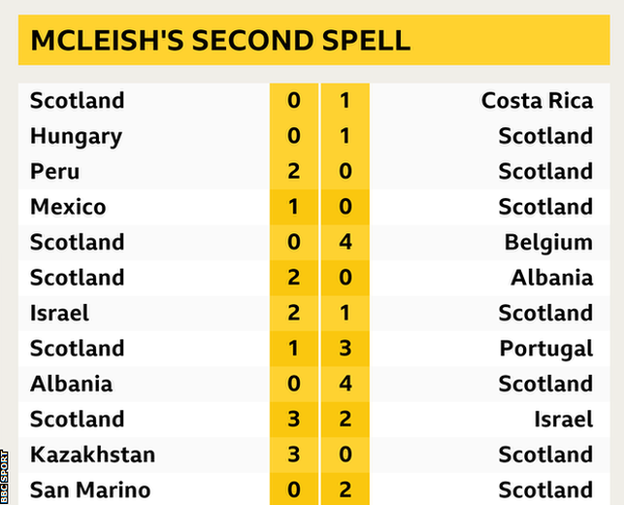Scotland: Alex McLeish exits after poor start to Euro 2020 qualifying
- Published
- comments
Watch: How McLeish's reign unravelled
Alex McLeish says he was "grateful for the opportunity" after his second spell as Scotland head coach ended after 14 months in charge.
McLeish, 60, took charge for a second time in February 2018 but came under increasing pressure after a poor start to the Euro 2020 qualifiers.
The decision was "agreed collectively in consultation with Alex" at a Scottish FA board meeting at Hampden.
"I leave knowing that I gave my all," said McLeish in a statement.
Scottish FA chief executive Ian Maxwell said the former Rangers, Birmingham City and Aston Villa manager had "accepted the decision" with "good grace".
Maxwell added that the decision "was not an easy one" and came after an "honest and respectful conversation" between himself and McLeish earlier this week.
McLeish's coaching staff - Peter Grant, James McFadden and Stevie Woods - have also left their roles.
The Scottish FA say the search for a successor "will begin immediately".
McLeish 'proud' of Nations League success
McLeish had been chosen as Gordon Strachan's successor after the Scottish FA failed in its attempt to recruit Michael O'Neill - who instead chose to stay with Northern Ireland - and oversaw 12 matches, winning five and losing seven.
His departure comes a month after Scotland were humiliated 3-0 by world ranked 117 nation Kazakhstan, then recorded an unconvincing 2-0 win over San Marino, the world's lowest-ranked side.
"I am proud that together we finished top of our Uefa Nations League group and qualified for the Euro 2020 play-offs, which gives us a real opportunity to reach a major tournament for the first time in over 20 years," McLeish added.
"I am also pleased to have given many younger players a first taste of international football that will stand them - and the country - in good stead for the future."
The national team resumes their campaign in June against Cyprus and Belgium as they look to end a 22-year wait for a major tournament finals appearance.
"The board believes a change of management is necessary to reinvigorate the European qualifying campaign," a Scottish FA statement read.

McLeish's second term in numbers
Under McLeish, Scotland's world ranking has fallen by eight places. When he took charge, they were ranked 32nd but have dropped 12 places to their current ranking of 44th.
Scotland have averaged just 1.17 goals per game - the third-lowest return by any manager since their last major tournament outing in 1998 - and conceded an average of 1.5 goals per match. That figure is worse than the 1.1 conceded under Strachan but also surpasses the poor performances under Craig Levein, George Burley and Berti Vogts.
McLeish has also used 46 players in his 12-game tenure. That is almost double the 26 he utilised during his first stint in 2007 and was on course to top the 58 selected by Strachan during four years in charge. In fact, when examining personnel changes made from one match to next, McLeish's average of 3.83 is considerably higher than Vogts' 2.48, despite the German's reputation for handing out caps while manager between 2002 and 2004.
McLeish 'should never have been appointed' - analysis
BBC Scotland's chief sports writer Tom English
An unpopular choice has had an unseemly end. Scottish football deserved better than what McLeish could bring to the job, but McLeish deserved better than Scottish football speculating openly about the state of his health. It's been a humiliating and troubling end on many fronts.
He should never have been appointed. McLeish's track record in management in recent years has been very poor and yet he got the job. He was a diminished character even before Alan McRae, his old pal and the Scottish FA's president, and Rod Petrie, the vice-president, unveiled him as the new manager. Serious questions must be asked of both of these men. Neither of them should be allowed anywhere near the next appointment. They are hugely discredited by this.
McLeish was under pressure from day one and didn't have the capacity to deal with it. It was painful to watch at times. It's now over, but the old problems remain at Hampden. It's not just about who the next manager should be, it's about who can be trusted to appoint that new manager.
Watch: Scotland fans react to McLeish exit